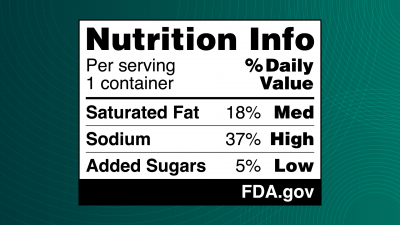The Food and Drug Administration is proposing a new rule that could have an impact on what you buy at the grocery store.
Earlier this month, the FDA proposed requiring nutritional labels on the front of packaged foods.

The simplified box on the front would tell you how much saturated fat, sodium and added sugar is inside, and would include whether that’s a lot, a little or a medium amount.
“It will be near impossible to miss the nutritional value of certain foods,” said Dr. Julie Chen, an internal medicine physician and lifestyle medicine physician at Kaiser Permanente of the mid-Atlantic states.
Doctors, startled by the rise in diabetes and obesity, are applauding the idea.
“They’re also going to simplify the label so that it points out what percentage of fat, meaning saturated fat, as well as salt and sugar, is contained in the food that the person is purchasing,” Chen said.
The concept is already common in several other countries.
“They’ll know right off the bat that that’s either a healthier food with better nutritional value or one that is really detrimental or harmful to the health that could also increase their risk of becoming obese or developing diabetes,” Chen said.
The FDA is taking comments on the new proposed rule until May 16. If it goes forward, it would still be another three years before the new packaging rules started to take effect. It would be in addition to, not a replacement for the broader nutritional labels you see on the back of packaged foods.
“I think that it’ll really raise awareness so that people will be able to steer away from foods that are lower quality calories,” Chen said.
Get breaking news and daily headlines delivered to your email inbox by signing up here.
© 2025 WTOP. All Rights Reserved. This website is not intended for users located within the European Economic Area.





